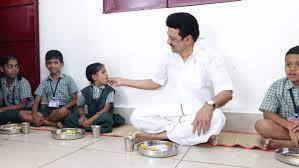Eat and learn: On Tamil Nadu’s breakfast scheme in schools
T.N.’s breakfast scheme is a good model for other States to follow
Sometimes the ability of a government to find resources for a good scheme is only limited by its intent. The Tamil Nadu government’s launch of the free breakfast scheme for schoolchildren is an instance of a policy initiative with far-reaching consequences for school education and public health. As Chief Minister M.K. Stalin himself said at the launch of the scheme, provision of free breakfast is not a freebie, but the foremost duty of a government to ensure no child goes hungry. Mr. Stalin framed his words and deeds from the promontory of the progressive Dravidian model, which promises inclusive growth for all segments of the population. A key element is the welfare of children, which explains Tamil Nadu’s early emphasis on feeding children in schools. The importance of a daily breakfast as the most important meal of the day is widely acknowledged. Multiple studies across the globe indicate that eating breakfast regularly confers positive outcomes on students, affecting their ability to focus, learn and retain information positively. School performance improves, as do behaviour and cognition, but a regular breakfast also takes care of diet quality, micronutrient sufficiency, anaemia and height and weight issues in children, and is even believed to sculpt BMI scores for the future. The government has targeted providing schoolchildren an average of 293 calories and an average protein input of 9.85 gm per day. The mid-day meal that is already being provided to students in schools comes up to an average of 553 calories and 18 gm of protein, giving every student who takes the food supplied in school about 846 cal and nearly 28 gm of protein a day. The Centre’s midday meal guidelines prescribe between 450-700 cals per child per day, and a protein intake of 12-20 gm per day.
While the proposed menu for the Tamil Nadu government’s breakfast scheme will take care of hunger, the calorific, energy and micronutrient requirements of the children, with a diet rich in local preparations and vegetables, it also has to provide adequate attention to taste and quality parameters. The government, rich with its experience of dealing with the mid-day meal scheme over several decades, must avoid the errors of omission and commission — including pilferage, poor quality of food, delays in sanctioning funds, and caste-related disruptions — that have been hurdles in its path earlier. Other State governments would also do well to be inspired by Tamil Nadu, which has allowed its intent to triumph over the state of its finances, finding money to fund this very crucial aspect of nation building — ensuring the growth and development of children.
